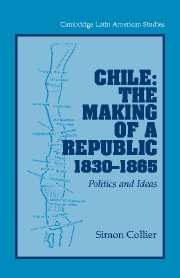Book contents
- Frontmatter
- Contents
- Acknowledgments
- Abbreviations Used in the Notes
- Introduction
- PART I THE NEW REPUBLIC, 1830–1865
- PART II FROM PORTALES TO MONTT, 1835–1851
- 3 Authoritarians and Moderates, 1835–1846
- 4 The Liberal Challenge, 1846–1851
- PART III MID-CENTURY ATTITUDES
- PART IV ORDER AND LIBERTY, 1851–1864
- Sources
- Index
4 - The Liberal Challenge, 1846–1851
Published online by Cambridge University Press: 24 July 2009
- Frontmatter
- Contents
- Acknowledgments
- Abbreviations Used in the Notes
- Introduction
- PART I THE NEW REPUBLIC, 1830–1865
- PART II FROM PORTALES TO MONTT, 1835–1851
- 3 Authoritarians and Moderates, 1835–1846
- 4 The Liberal Challenge, 1846–1851
- PART III MID-CENTURY ATTITUDES
- PART IV ORDER AND LIBERTY, 1851–1864
- Sources
- Index
Summary
The Rise and Fall of Manuel Camilo Vial
President Bulnes seems to have wished to start his second term in the same way as his first, in a relaxed atmosphere. His new Interior (and temporary Finance) minister, the ambitious, sometimes bad-tempered but also broad-minded Manuel Camilo Vial, one of the younger filopolitas of 1835, was a cousin. The poet Salvador Sanfuentes took the Justice portfolio. All those arrested and punished during the recent spasm of repression were freed or allowed to return from exile. Vial almost certainly had his eye on the presidential succession in 1851, as was sometimes alleged in the press. Before it closed down in 1847, the Liberal Gaceta del Comercio in Valparaiso conducted a running battle with El Mercurio, which maintained that Vial was merely continuing the work of the Montt cabinet. The Gaceta denied that the new cabinet was “retrograde,” hailing it as both “liberal” and “progressive.” In November 1847, Vial abruptly withdrew the government's subsidy to (and started withholding Customs information from) El Mercurio. The administrator of the Customs House, Fernando Urízar Garfias, told El Mercurio's owner, Santos Tornero: “It's true, Don Santos, that we haven't been able to ruin your enterprise, but … we shall cause you all the difficulties we can.” Unsurprisingly, El Mercurio began to be openly critical of Vial.
At first it was the only newspaper that was. It took time for the renewed good feelings of Bulnes's second term to show signs of dissipating.
- Type
- Chapter
- Information
- Chile: The Making of a Republic, 1830–1865Politics and Ideas, pp. 76 - 102Publisher: Cambridge University PressPrint publication year: 2003

